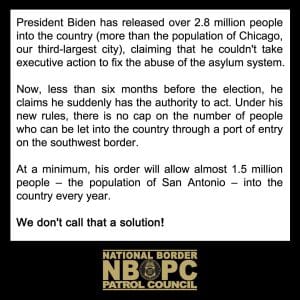THE UNION’S DUTY OF FAIR REPRESENTATION
A. The Duty of Fair Representation (DFR) comes from Section 7114(a)(1) of the Statute. The basic principle of DFR:
A Union must use its power to fairly and equally represent all employees in the bargaining unit. As a general rule, the Union must represent employees without regard to Union membership.
B. Two common types of disputes concerning DFR:
1. Claims of discrimination against non-members
2. Claims of ineffectual or incompetent representation
C. Discrimination Based Upon Union Membership
1. A Union is only required to represent employees without regard to Union membership if the Union has exclusive control over the matter, and is the employee’s sole choice of representative in the matter.
a. When the employee may choose a representative other than the Union, then the Union can discriminate against non-members:
(1) MSPB proceedings. See NTEU v. FLRA, 800 F.2d 1165 (D.C. Cir. 1986); and AFGE Local 916 v. FLRA, 812 F.2d 1326 (10th Cir. 1987).
(2) Lawsuits in court. Fort Bragg Association of Educators, National Education Association, Fort Bragg, NC and Fort Bragg Department of Defense Dependents Schools, 28 FLRA 908 (1987). The Union’s decision to charge nonmembers $500 to join a class action lawsuit was not a breach of the DFR.
(3) Responses to a notice of proposed disciplinary action (where the employee is given the right to reply orally and/or in writing, and may be represented by a representative of his or her choosing). See AFGE, Local 1857 (Sacramento Air Logistics Center, North Highland, CA) and Eloise F. Holdahl, 46 FLRA 904 (1992).
2. When the Union has exclusive control; that is, the employee’s only choice for a representative is the Union, then members and non-members must be treated alike. Some areas where the Union has exclusive control, and could violate the duty of fair representation include:
a. Enforcing the contract, or providing contract benefits differently for members and non-members.
(1) The Union negotiated an agreement with the agency to have employees tested for asbestos exposure. The agreement provided that dues paying members could take administrative leave to be tested, but non-members had to take sick leave (or be tested on their own time). This is a violation of the Duty of Fair Representation. See Department of the Army, Watervliet Arsenal, NY and NFFE, Local 2109; Department of the Army, Watervliet Arsenal, NY and Arthur W. Brooks; NAGE, Local R2‑98 and George W. LaWare, Jr., 39 FLRA 318 (1991).
(2) Loring Air Force Base, Limestone, ME, and AFGE Local 2943, 43 FLRA 1087 (1992). Agency agreed to a $125,000 grievance settlement for 63 employees and supervisors who didn’t get environmental differential pay when they should have. Union was to determine how to distribute the money. The distribution favored union members, and thus violated the DFR.
(3) A Union proposal that Union membership be used as a tie breaker in selecting from among equally qualified employees for assignments was a ULP. PASS Region 2 (FAA, Sacramento, CA) 9-CO-80017 (3/31/89) (This was settled without ever going to hearing.)
b. Invoking arbitration using different standards for members and non-members.
- 1.It is a violation for the Union president to tell the grievance committee to take an employee’s Union membership into account in determining whether or not to proceed to arbitration. AFGE Local 2501, 51 FLRA 1657 (1996).
c. Requiring arbitration fees for non-members that are not required for members.
- 1.Statements to employee that because she was not a dues paying member, the Union would not work as hard on her case and would not pay for arbitration of the case was a violation. AFGE Local 1228 and Patricia Dearduff, ALJ Decision 7-CO-10015 (3/19/92).
d. Distributing back pay award to members differently than non-members.
See AFGE Local 1857, 28 FLRA 677 (1987), where the Local improperly removed one person’s name from a list of employees eligible to receive back pay pursuant to a grievance settlement.
e. Making statements implying that employees who do not pay dues will not receive the same quality of representation in grievances, ULP proceedings, or other matters:
(1) AFGE LOCAL 2437 and Dept. of Veterans Affairs, 53 FLRA No. 35 (1997). Local president’s five minute speech at new employee orientation session violated the Statute.
(2) AFGE Local 987 and Warner Robins Air Logistics Center, 35 FLRA 720 (1990). Union newsletter contained an article stating non-dues paying persons wishing to file grievances on the recently publicized overtime pay issue should join the Union to assure prompt representation. This statement is a violation.
(3) AFGE Local 987 and Warner Robins Air Logistics Center, 35 FLRA 563 (1990). The Union violated statute by telling employee she would not receive full representation unless she joined the Union. She was also told that if her case needed a lawyer, it would be best if she were a member, as the Union did not like to spend money for lawyers for nonmembers. Union tried to defend by claiming steward was only referring to statutory appeals, where Union is not required to represent non-members. But ALJ didn’t buy it.
D. Claims of ineffectual or incompetent representation
The Union violates the Duty of Fair Representation when it’s conduct is arbitrary and in bad faith; that is, if the Union deliberately and unjustifiably treats one or more bargaining unit employees differently from other employees in the unit.
1. Arbitrary: The Union’s conduct must be deliberate (not accidental), and it must be unjustified.
a. the Union’s conduct must fall outside the range of reasonable behavior.
b. the Union’s conduct must amount to more than negligence, inexperience or ineptitude.
2. Bad Faith: The Union’s actions must result in the employee being treated differently from other bargaining unit employees.
a. There is an element of discrimination here. To use an EEO term, the complaining employee must be treated in a disparate manner.
b. If the Union follows its normal procedures and standards, there is no violation.
3. Examples:
a. Union’s failure to file grievances over three letters of counseling was not arbitrary or in bad faith. The Union attempted to resolve the matter by other means, i.e. through negotiations and also through a whistleblower complaint. The employee had not specifically asked the Union to file grievances, and the Union had made no assurances. There was no violation. AFGE Local 1457 and Gwen Horn, 43 FLRA 575 (1991).
b. An employee asked the Union to grieve a five day suspension. The Local President traveled from Chicago to Cleveland and spent three days investigating the situation. He assured the employee he would file a grievance. Thereafter, he became ill and was out of work for a month. He filed the grievance on his first day back, but it was rejected as untimely. The Union then decided not to pursue the matter because the grievance lacked merit.
At first, the ALJ found a violation, saying the President should have delegated the task of filing the grievance to someone else when he became ill. But the Authority disagreed, and dismissed the complaint. It found the President was inexperienced, having handled only five grievances in the past, and he had been ill. There was no evidence that the Union had deliberately or unjustifiably treated the complainant differently from other unit employees. The President’s actions amounted to mere negligence. See AFGE Local 3529, 31 FLRA 1208 (1988).
c. An employee contacted the Union’s chief steward several times to ask him to file a grievance protesting a five day suspension. He also contacted his local steward with the same request. Despite these repeated requests, the Union allowed the contractual time limits to expire without filing a grievance. The FLRA found the Union deliberately and unjustifiably failed to file a grievance on behalf of the employee. Thus, it treated him differently from other employees. Moreover, the Union’s actions caused the grievant’s appeal rights to be extinguished (there was no other avenue of appeal open to the employee for this type of disciplinary action). Therefore, as a remedy, the Authority ordered the Union to reimburse the employee for the five days of the suspension.
d. Over a nine month period, the Union repeatedly assured the employee that his grievance would be taken to arbitration. However, the Union had never invoked arbitration on his behalf. The ALJ found that there had been a program of deception and deliberate and intentional misconduct on the part of the Union. AFGE Local 1945 and Sam Cash, 4-CO-10025 (ALJ Decision 6/25/93)
E. Remedies: If the Union Has Breached its DFR, What is the Penalty?
1. General Rule: The FLRA will seek to put the employee in the place he/she would have been in, absent the Union’s unlawful conduct.
2. Cases that Involve Grievances
a. The Union will be required to ask the agency to waive the time limits and process the grievance.
b. If the agency refuses, the FLRA Regional office will determine (during the investigation of the ULP charge) if the grievance was meritorious.
c. If the grievance had merit and the agency refuses to process the grievance, then the General Counsel will seek a make-whole remedy.
This means that if the employee was fired, the Union could be liable for back pay for a very long period of time. Large amounts of money could be at stake.
F. When Must Non-Members Views Be Considered By The Union?
Only where the Union has the absolute right to establish a condition of employment, without negotiating with management.
1. Situations where participation may be limited to dues paying members include:
a. attending Union meetings;
b. voting for Union officers;
c. representing the Union in any capacity;
d. taking advantage of special Union sponsored credit cards, life insurance, etc.;
e. voting whether to ratify a new collective bargaining agreement;
f. voting on proposals to make during contract negotiations;
Although non-members do not have the right to participate in the Union’s decisional process, the proposals themselves may not discriminate on the basis of Union membership. The Union is still required to represent all employees in the bargaining unit without regard to Union membership.
2. Situations where non-members must be allowed to participate include:
a. The agency and the Union reached an agreement that the Union would determine how seniority would be calculated for certain benefits (such as assignments and overtime). The Union conducted a members only poll to decide which method to use. The Authority found this violated the DFR by differentiating between employees on the basis of Union activity. As a remedy, the new procedure was rescinded, and the Union was ordered to make whole any employee who lost money because of the change. See NFFE Local 1827 and Catherine Bratton, 49 FLRA 738 (1994).
The irony is that if the Union officers had simply decided, with no input at all from the bargaining unit, there would have been no violation.
G. A Federal Employee May Not Sue In Court To Enforce the Union’s Duty of Fair Representation
1. In 1989, a unanimous Supreme Court ruled that a federal employee has no right to bring a private lawsuit to enforce the Union’s statutory duty of fair representation. The only remedy available to the employee is to file a ULP with the FLRA. See Karahalios v. NFFE Local 1263, 109 S.Ct. 1282, 489 U.S. 527 (U.S. Sup. Ct. 1989).
a. It is common for private sector Unions to be sued for breach of the duty of fair representation.
b. This does not mean the Union might not be sued on some other matter.


